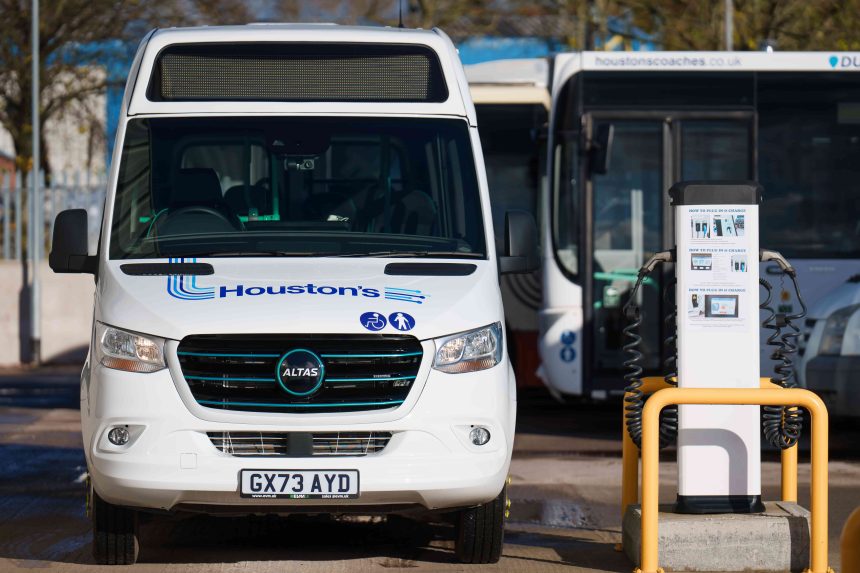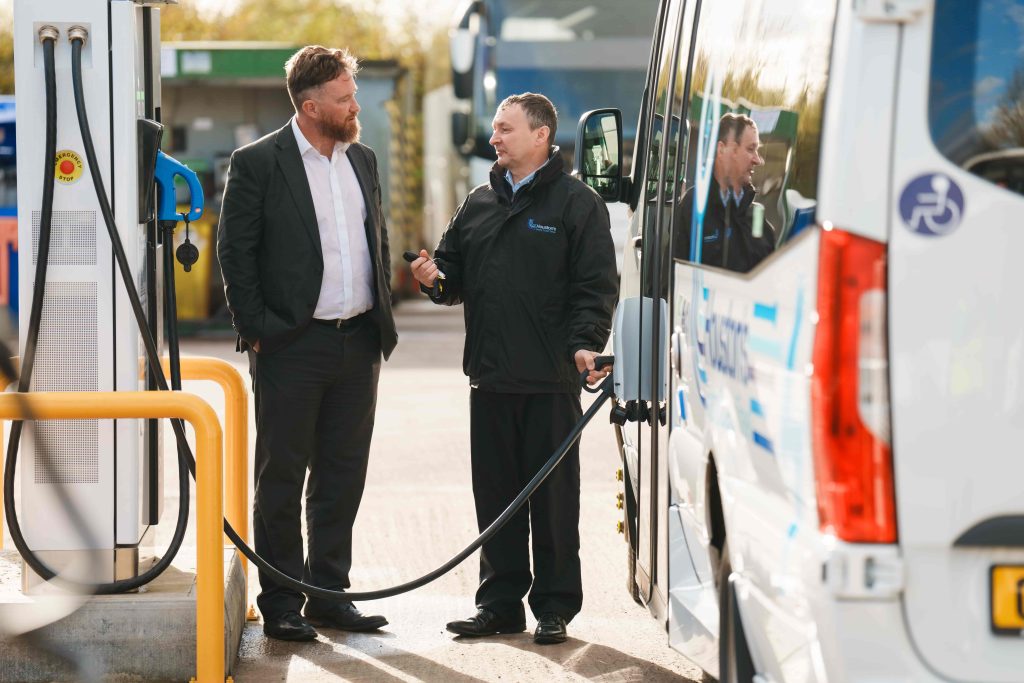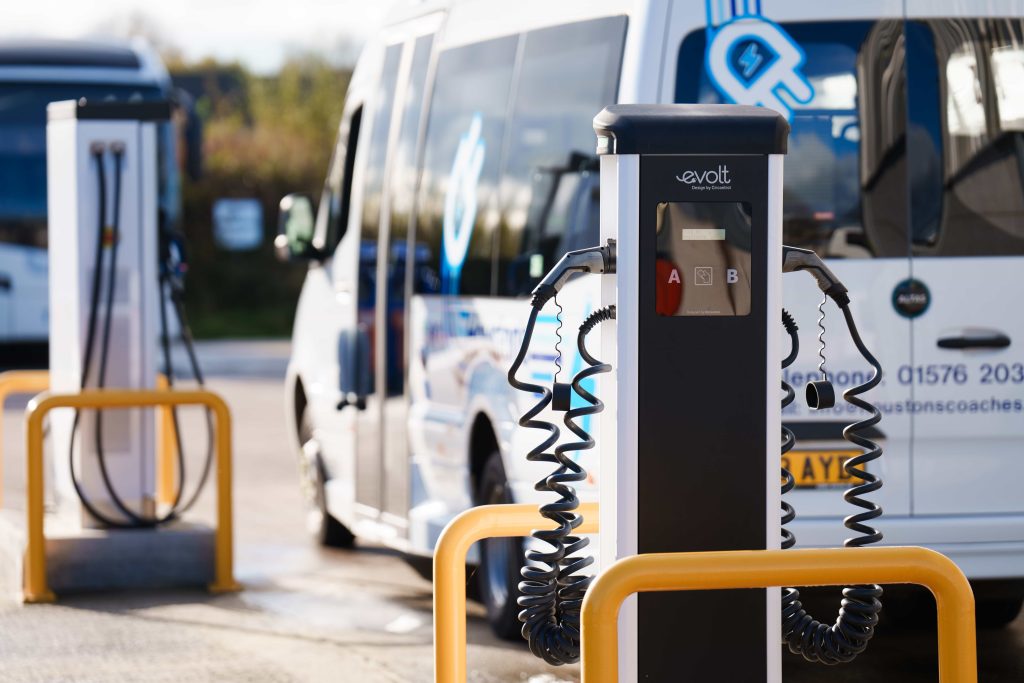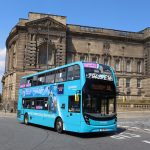In the face of the unique demands and logistical challenges of rural transportation, in February Houston’s Coaches of Lockerbie marked a year since transitioning to using battery-electric vehicles across Dumfries and Galloway.
The move was underpinned by the support of ScottishPower and the Scottish Zero Emission Bus challenge fund (ScotZEB). The year anniversary marked substantial progress with Houston’s new electric fleet amassing over 250,000 zero-emission miles and slashing the operator’s CO2 output.
Business case through partnership
Houston’s partnership with energy company ScottishPower is what proved instrumental in navigating complexities around electrification in Houston’s region, particularly when it came to securing necessary funding.
“At first it was a bit daunting, but as soon as we had committed to the idea and started working with a reputable supplier like ScottishPower, the entire process was incredibly straightforward,” explains Lorilee Kirkpatrick, ScotZEB Project Manager at Houston’s Coaches. “ScottishPower came and assessed our site, using its knowledge to guide us in our funding application to ScotZEB.
“As we were successful in our application, we were able to purchase four brand-new electric vehicles with the necessary charging points installed, all managed by ScottishPower.
“To be fair, ScottishPower was the expert in getting the infrastructure built, it guided us through the whole process and took away all the hassle. This included helping us upgrade our connection capacity and providing us with the right EV chargers for our needs. It even trained our drivers, some of whom had no previous experience of electric vehicles, before the install.
Overall, the switch to electric has been smooth and more importantly, helped our customers to travel more sustainably as part of their everyday activity.”
All four buses used were acquired from EVM and are Mercedes-Benz Sprinters with e-Cityline conversions. For its various routes the operator purchased two 19-seater buses and two 16-seaters to ensure space and comfort for passengers.
Response has been positive and Houston’s drivers, who previously used to operate traditional London RT type buses according to Lorilee, have responded well to the change. “The drivers have commented on their smoothness, the quietness on the roads and even the sleek new designs.
“This has now been echoed by our passengers, who have been full of praise for the buses. They note how comfortable they are to travel on and have mentioned that it’s a benefit to them to be able to travel sustainably, without impacting their daily routines. We hope to continue to lead the way in providing greener travel solutions to the communities we serve and encourage other operators to do the same.”
The transition has not just been about adhering to environmental mandates, though these have been set out by Dumfries and Galloway Council with a commitment to achieving zero carbon emissions by 2040.
Lorilee reveals that running costs have been reduced since the switch to electric and the transition has eased the operator’s dependence on fluctuating fuel prices. “However, the main impact has been to our emissions. In just a year of electric charging, we have reduced our carbon emissions by over 37.5 tonnes. Maintenance of the chargers has also been made simpler by ScottishPower, with any issues efficiently and quickly sorted.”
Long-term goals
Following the success of the introduction of its first four electric minibuses, Houston’s says it is now looking to pursue electrification across the rest of its fleet. “Electric is undoubtedly the future,” says Lorilee, “and we want to be ahead of the game.
“As more businesses and communities prioritise the adoption of electric as the necessary next step in the evolution of public transportation, we hope to add more routes with our expanding fleet of fully electric buses.”
That sentiment is echoed by Andy Mouat, Head of Smart Mobility at ScottishPower, who hints at an ecosystem of shared charging that can result from initiatives such as the one at Houston’s. “We’re committed to supporting all organisations in the switch towards a greener future,” he says. “This includes those that are located within rural areas, such as Houston’s Coaches, that may not currently have the access and resources to make the switch. It’s imperative that these businesses are not left behind.
“Houston’s Coaches has emerged as a leader within its industry and its community through this adoption of green tech. As more organisations take that first step in electrifying their fleet, we have the opportunity to create a huge network of electric vehicle charge points across the country. With the UK government banning the sale of new diesel and petrol cars as soon as 2035, it is imperative that organisations begin planning to make the switch to electric.”
Andy adds that investment in green tech solutions will future proof businesses in other ways, attracting new customers and unlocking new revenue streams via the likes of EV charging.
“We wanted to make a difference in the sustainability of our business and our local community,” adds Lorilee. “We feel that one business alone cannot make the change to save our planet, but in collaboration, we can make a difference.
“We want to be prepared for the big changes coming, futureproofing our fleet for our employees
and customers. The transformation to our fleet in just one year has been a huge first step in making a full transition to electric and hitting the council and country’s net-zero goals. We hope our work with ScottishPower inspires others to do the same. Going greener does make good business sense.”





























